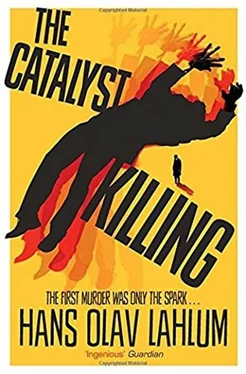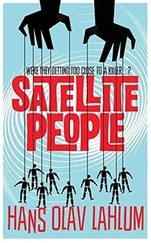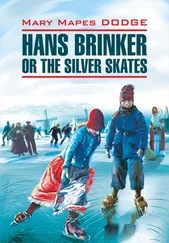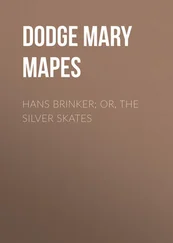It occurred to me that it was rather odd that we had heard nothing from her parents or other relatives. When I looked in the telephone directory, I discovered that a Martin Morgenstierne lived at the same address, and he was listed as bank manager. I dialled the number several times and let it ring for a long time, without getting an answer.
In anticipation of the family getting in touch or of finding any information about Marie Morgenstierne, I threw myself into the rather thick file regarding her fiancé’s disappearance in August 1968. It was exciting stuff and, like Patricia, I found it hard to believe there was no connection between Falko Reinhardt’s disappearance and Marie’s death.
Falko Reinhardt, Marie Morgenstierne and four other young people from radical student circles at the University of Oslo had travelled together to a cabin in Vestre Slidre in Valdres on Saturday, 3 August 1968. The statements were unanimous in that Falko had been the one who initiated the trip, the purpose of which was to have four uninterrupted days to plan the autumn’s anti-Vietnam demonstrations and other activities, as well as spend time together. The first two days of the trip had passed without incident.
On Monday, 5 August Falko had left the cabin for a few hours, without saying before or afterwards where he had gone. In the evening a storm had blown up, with driving rain and wind, and the six students had stayed indoors. Some alcohol had been consumed, but as they later remembered it, it was not a lot. The storm had instilled a growing feeling of unease. This had been triggered by an episode earlier in the evening when one of the young women claimed to have seen a face wearing a black eye mask look in at the window. The students had gone out into the storm together, but found no trace of anyone. ‘Incident very odd indeed, but statements credible nonetheless’ was written across the report from the hearings. I noted this down and continued to read with keen interest.
The real drama in Valdres did not start until two in the morning, when Marie Morgenstierne screamed so loudly that two of the students sleeping in another room woke up.
They came rushing in to find her alone in the bedroom. Falko Reinhardt’s side of the bed was empty. His jacket was still hanging in the wardrobe, but the rest of his clothes and shoes were gone. The window was closed, because of the rain outside.
At this point, my reading was interrupted by an irritating, impatient knocking on my office door. It was five past eleven.
I sighed, put down the papers with considerable reluctance and opened the door. The person responsible for this interruption proved to be a very flustered pathologist.
‘The woman from the tracks was not only dead before the train hit her, but even before she fell on the rails…’ he stammered.
With an impatient wave, I indicated that he should continue. ‘She was shot. I have already established that!’
The pathologist nodded eagerly and bowed, obviously impressed with the pace of my investigation.
‘This is slightly less certain, but I also have reason to believe that she was not shot with an ordinary hunting rifle.’
He nodded even more frantically and bowed even more deeply. ‘It is truly incredible what you have been able to work out by yourself without technical assistance. The bullet appears to come from an older, less common 22-calibre gun, possibly a small-bore rifle or some other relatively light weapon, but could also have been a pistol of some sort.’
I asked the pathologist if he had anything else of importance to tell, then sent him out of the office when the answer was no. My thoughts were still in Valdres in the summer of ’68, on the stormy night when Falko Reinhardt vanished from a bedroom where the window was closed from the inside.
How Falko Reinhardt had disappeared from the cabin was a mystery in itself. According to the police statements, one of the female students in the next room had been awake all night with a headache and the door was ajar. She was able to give an accurate account of who had passed the door after midnight. Marie Morgenstierne had gone out to the kitchen for a glass of water, and one of the male students had gone out onto the step for some fresh air. And the other young man had gone to the toilet. But none of them had seen or heard anything of Falko Reinhardt – and yet he was gone.
According to the statements from Marie Morgenstierne and the others, she was beside herself and convinced that her fiancé had been abducted or murdered. They had discussed the situation for an hour in the hope that he would show up again, but the group grew increasingly uneasy when he failed to appear. It was Marie Morgenstierne who had pushed for them to go out into the storm together at around three in the morning. But there was no sign of Falko or anyone else near the cabin. One of the students said that she saw a person in the distance through the storm, but it was too far away and visibility was too poor for any of the others to verify this.
The five students had then retreated back into the cabin. They had stayed awake for the rest of the night, huddled together in the living room, anxious and upset, without any means of contacting the outside world or doing anything at all.
When the storm subsided the following morning, the students went out together again. There were still no footprints to be found. But they did make a very worrying discovery not far from the cabin.
They found Falko Reinhardt’s left shoe behind a large stone not far from a sheer drop of around three hundred feet.
This obviously made them fear that he might have fallen, been pushed or jumped off the cliff in the dark, though the latter idea made the students indignant and they dismissed it. The theory that Falko Reinhardt’s life had in some way ended on the stones at the base of the cliff was reinforced when his right shoe was found in the scree later in the day.
The only problem was that no one could find Falko Reinhardt, or any trace of him, even when the area was searched twice by a large contingent from the Home Guard. Dead or alive, the missing man had simply vanished, first from the cabin, and then into thin air.
Falko Reinhardt had taken several language courses at the University of Oslo, but at the time of his disappearance was a good way through writing his thesis for a master’s degree in history. He had written about a Nazi network during the war. A few weeks before he disappeared Reinhardt had told his supervisor, the renowned professor Johannes Heftye, that he had made a remarkable discovery that could indicate that parts of the network were still active.
One of the main leads in the investigation after this was an elderly, wealthy farmer called Henry Alfred Lien, a former convicted Nazi, who had been a member of the fascist Nasjonal Samling in Valdres. According to the thesis, he had been active in the network during the war. However, Lien proved to be ‘extremely uncommunicative’ in his meeting with the police in 1968. He claimed to have been at home on his farm a good few miles away on the night in question, and denied any knowledge of Falko Reinhardt’s disappearance.
He also threatened the police with legal action if anything was said to link his name to the case, so of course that never happened. There was no evidence that Falko Reinhardt had been the victim of a criminal act, and even less that Henry Alfred Lien was involved in his disappearance. To be on the safe side, and at his own cost, Lien had travelled to Oslo and taken a lie-detector test, during which he answered only two questions. The first was whether he had participated in the abduction of a student by the name of Falko Reinhardt. The second was whether he had been involved in the death of a student by the name of Falko Reinhardt. According to the attached certificate, the answer from the lie detector to both questions had been a clear no.
Читать дальше












